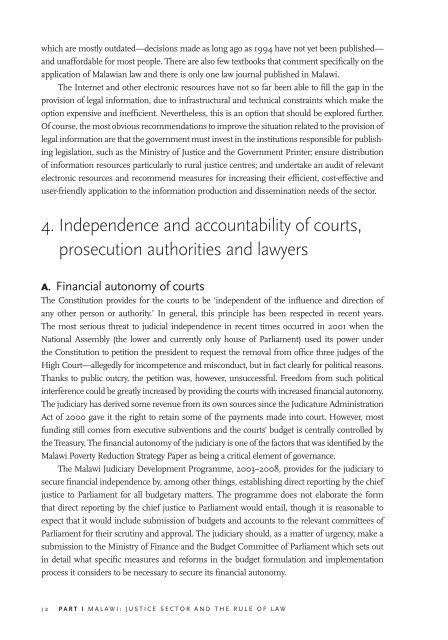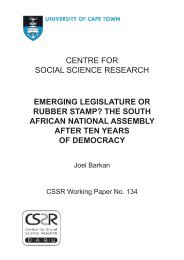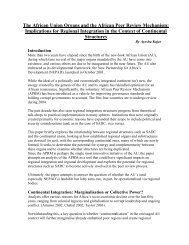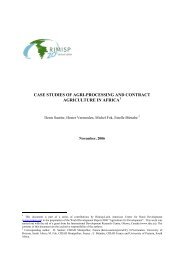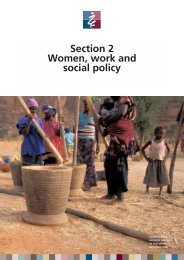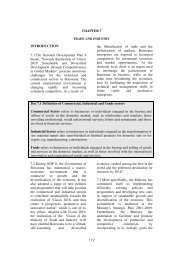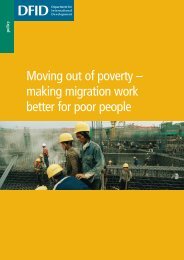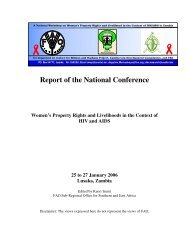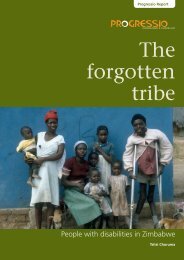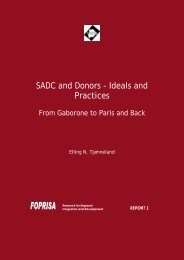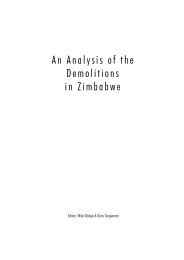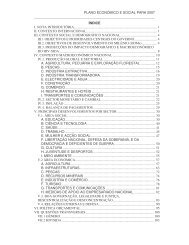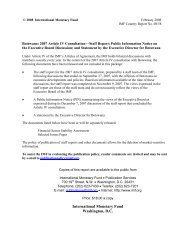Justice Sector and the Rule of Law - AfriMAP
Justice Sector and the Rule of Law - AfriMAP
Justice Sector and the Rule of Law - AfriMAP
Create successful ePaper yourself
Turn your PDF publications into a flip-book with our unique Google optimized e-Paper software.
which are mostly outdated—decisions made as long ago as 1994 have not yet been published—<strong>and</strong> unaffordable for most people. There are also few textbooks that comment specifically on <strong>the</strong>application <strong>of</strong> Malawian law <strong>and</strong> <strong>the</strong>re is only one law journal published in Malawi.The Internet <strong>and</strong> o<strong>the</strong>r electronic resources have not so far been able to fill <strong>the</strong> gap in <strong>the</strong>provision <strong>of</strong> legal information, due to infrastructural <strong>and</strong> technical constraints which make <strong>the</strong>option expensive <strong>and</strong> inefficient. Never<strong>the</strong>less, this is an option that should be explored fur<strong>the</strong>r.Of course, <strong>the</strong> most obvious recommendations to improve <strong>the</strong> situation related to <strong>the</strong> provision <strong>of</strong>legal information are that <strong>the</strong> government must invest in <strong>the</strong> institutions responsible for publishinglegislation, such as <strong>the</strong> Ministry <strong>of</strong> <strong>Justice</strong> <strong>and</strong> <strong>the</strong> Government Printer; ensure distribution<strong>of</strong> information resources particularly to rural justice centres; <strong>and</strong> undertake an audit <strong>of</strong> relevantelectronic resources <strong>and</strong> recommend measures for increasing <strong>the</strong>ir efficient, cost-effective <strong>and</strong>user-friendly application to <strong>the</strong> information production <strong>and</strong> dissemination needs <strong>of</strong> <strong>the</strong> sector.The Constitution provides for <strong>the</strong> courts to be ‘independent <strong>of</strong> <strong>the</strong> influence <strong>and</strong> direction <strong>of</strong>any o<strong>the</strong>r person or authority.’ In general, this principle has been respected in recent years.The most serious threat to judicial independence in recent times occurred in 2001 when <strong>the</strong>National Assembly (<strong>the</strong> lower <strong>and</strong> currently only house <strong>of</strong> Parliament) used its power under<strong>the</strong> Constitution to petition <strong>the</strong> president to request <strong>the</strong> removal from <strong>of</strong>fice three judges <strong>of</strong> <strong>the</strong>High Court—allegedly for incompetence <strong>and</strong> misconduct, but in fact clearly for political reasons.Thanks to public outcry, <strong>the</strong> petition was, however, unsuccessful. Freedom from such politicalinterference could be greatly increased by providing <strong>the</strong> courts with increased financial autonomy.The judiciary has derived some revenue from its own sources since <strong>the</strong> Judicature AdministrationAct <strong>of</strong> 2000 gave it <strong>the</strong> right to retain some <strong>of</strong> <strong>the</strong> payments made into court. However, mostfunding still comes from executive subventions <strong>and</strong> <strong>the</strong> courts’ budget is centrally controlled by<strong>the</strong> Treasury. The financial autonomy <strong>of</strong> <strong>the</strong> judiciary is one <strong>of</strong> <strong>the</strong> factors that was identified by <strong>the</strong>Malawi Poverty Reduction Strategy Paper as being a critical element <strong>of</strong> governance.The Malawi Judiciary Development Programme, 2003–2008, provides for <strong>the</strong> judiciary tosecure financial independence by, among o<strong>the</strong>r things, establishing direct reporting by <strong>the</strong> chiefjustice to Parliament for all budgetary matters. The programme does not elaborate <strong>the</strong> formthat direct reporting by <strong>the</strong> chief justice to Parliament would entail, though it is reasonable toexpect that it would include submission <strong>of</strong> budgets <strong>and</strong> accounts to <strong>the</strong> relevant committees <strong>of</strong>Parliament for <strong>the</strong>ir scrutiny <strong>and</strong> approval. The judiciary should, as a matter <strong>of</strong> urgency, make asubmission to <strong>the</strong> Ministry <strong>of</strong> Finance <strong>and</strong> <strong>the</strong> Budget Committee <strong>of</strong> Parliament which sets outin detail what specific measures <strong>and</strong> reforms in <strong>the</strong> budget formulation <strong>and</strong> implementationprocess it considers to be necessary to secure its financial autonomy.


